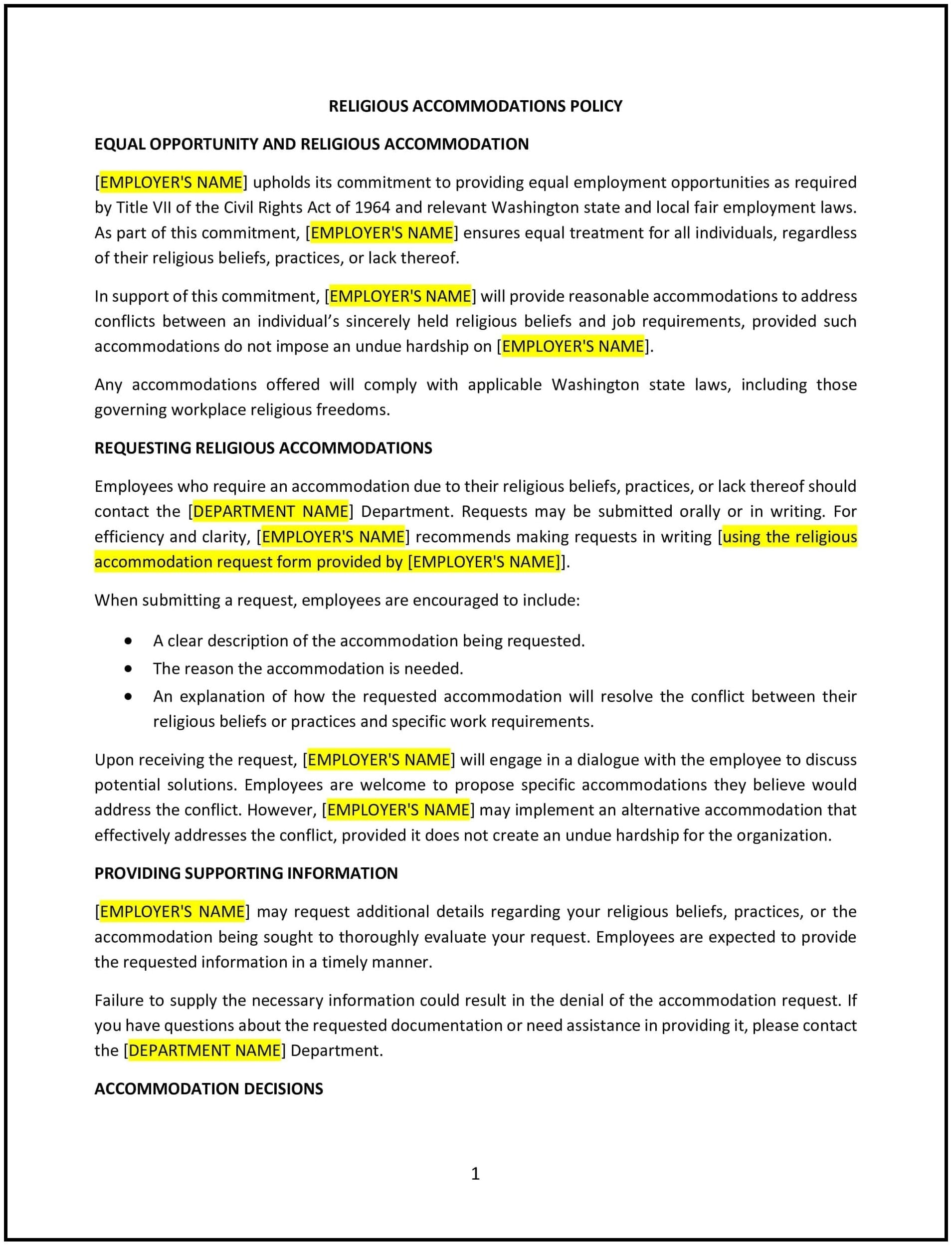Religious accommodations policy (Washington): Free template
Got contracts to review? While you're here for policies, let Cobrief make contract review effortless—start your free review now.

Customize this template for free
This religious accommodations policy is designed to help Washington businesses provide reasonable accommodations for employees' religious beliefs and practices in the workplace. The policy outlines how requests for religious accommodations will be handled, ensuring that employees are able to observe their religious practices without compromising their work responsibilities, while maintaining compliance with Washington state and federal laws.
By adopting this policy, businesses can promote a diverse and inclusive workplace, reduce the risk of discrimination claims, and ensure that employees' religious rights are respected and supported.
How to use this religious accommodations policy (Washington)
- Define religious accommodations: The policy should specify what constitutes religious accommodations, including requests for flexible scheduling, dress codes, time off for religious observances, and other adjustments to work practices that allow employees to observe their religious beliefs without undue hardship.
- Establish the process for requesting accommodations: The policy should outline how employees can request religious accommodations, including the steps for submitting a formal request, who to contact, and any documentation that may be required to support the request.
- Address the types of accommodations available: The policy should outline the types of accommodations that may be considered, such as changes to work schedules, adjustments to dress codes, or modifications to job duties. It should ensure that employees are aware of the range of accommodations available to meet their religious needs.
- Ensure the accommodation process is interactive: The policy should specify that the company will engage in an interactive process with employees to discuss potential accommodations, assess the feasibility of the request, and explore any alternative solutions that may work for both the employee and the company.
- Address undue hardship: The policy should clearly state that religious accommodations may be denied if they create an undue hardship for the company, such as significant disruption to business operations, excessive cost, or a significant safety risk. The policy should also explain how the company will assess undue hardship on a case-by-case basis.
- Ensure compliance with Washington and federal laws: The policy should comply with both Washington state laws and federal regulations, including Title VII of the Civil Rights Act of 1964, which requires employers to provide reasonable accommodations for employees’ religious practices unless it causes undue hardship.
- Review and update regularly: Periodically review and update the policy to ensure it remains compliant with Washington state laws, federal regulations, and any changes in company practices or operations. Regular updates will help ensure the policy stays relevant and effective.
Benefits of using this religious accommodations policy (Washington)
This policy offers several benefits for Washington businesses:
- Promotes diversity and inclusion: By accommodating employees’ religious practices, businesses create an inclusive environment that respects the diverse backgrounds of their workforce.
- Reduces the risk of discrimination claims: The policy helps businesses comply with state and federal laws and provides a clear framework for addressing religious accommodation requests, reducing the risk of legal disputes or claims of discrimination.
- Enhances employee satisfaction: Providing reasonable accommodations for religious practices can improve employee morale and job satisfaction, as employees feel respected and supported in their personal beliefs.
- Increases retention: When employees feel that their religious beliefs are respected and accommodated, they are more likely to remain with the company, improving employee retention and loyalty.
- Fosters a positive company reputation: Companies that demonstrate a commitment to diversity and inclusion by supporting employees' religious practices can improve their reputation as an employer of choice, attracting top talent from diverse backgrounds.
- Supports compliance with legal requirements: By adopting this policy, businesses can improve their compliance position with Washington state laws and federal regulations regarding religious accommodations, reducing the risk of legal consequences.
Tips for using this religious accommodations policy (Washington)
- Communicate the policy clearly: Ensure that all employees are aware of the religious accommodations policy and understand how to request accommodations. Include the policy in the employee handbook, review it during onboarding, and provide periodic reminders.
- Encourage open communication: Employees should feel comfortable discussing their religious accommodation needs with HR or management. Encourage an open dialogue to ensure that employees’ religious practices are respected and supported.
- Document accommodation requests: Maintain clear records of all religious accommodation requests, including the nature of the request, the company’s response, and any accommodations provided. This documentation helps ensure transparency and provides a record in case of disputes.
- Be flexible in providing accommodations: Work with employees to find accommodations that meet their religious needs while minimizing any impact on business operations. Flexibility in considering different solutions can help meet both the employee’s needs and the company’s goals.
- Assess undue hardship carefully: Carefully evaluate whether a requested accommodation would create an undue hardship for the company. If it does, engage in a discussion with the employee to explore alternative solutions that may be more feasible.
- Review and update regularly: Periodically review the policy to ensure it remains compliant with Washington state laws, federal regulations, and any changes in the company’s operations. Regular updates will help keep the policy relevant and effective.